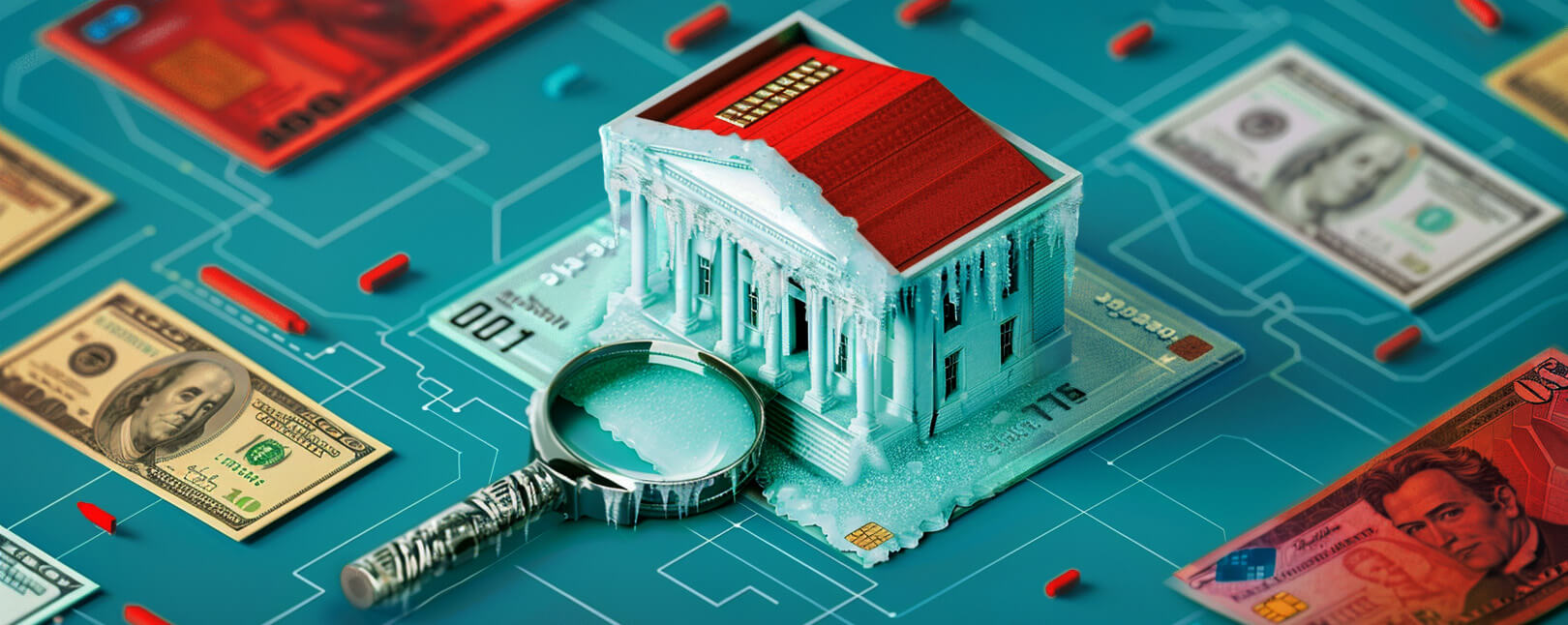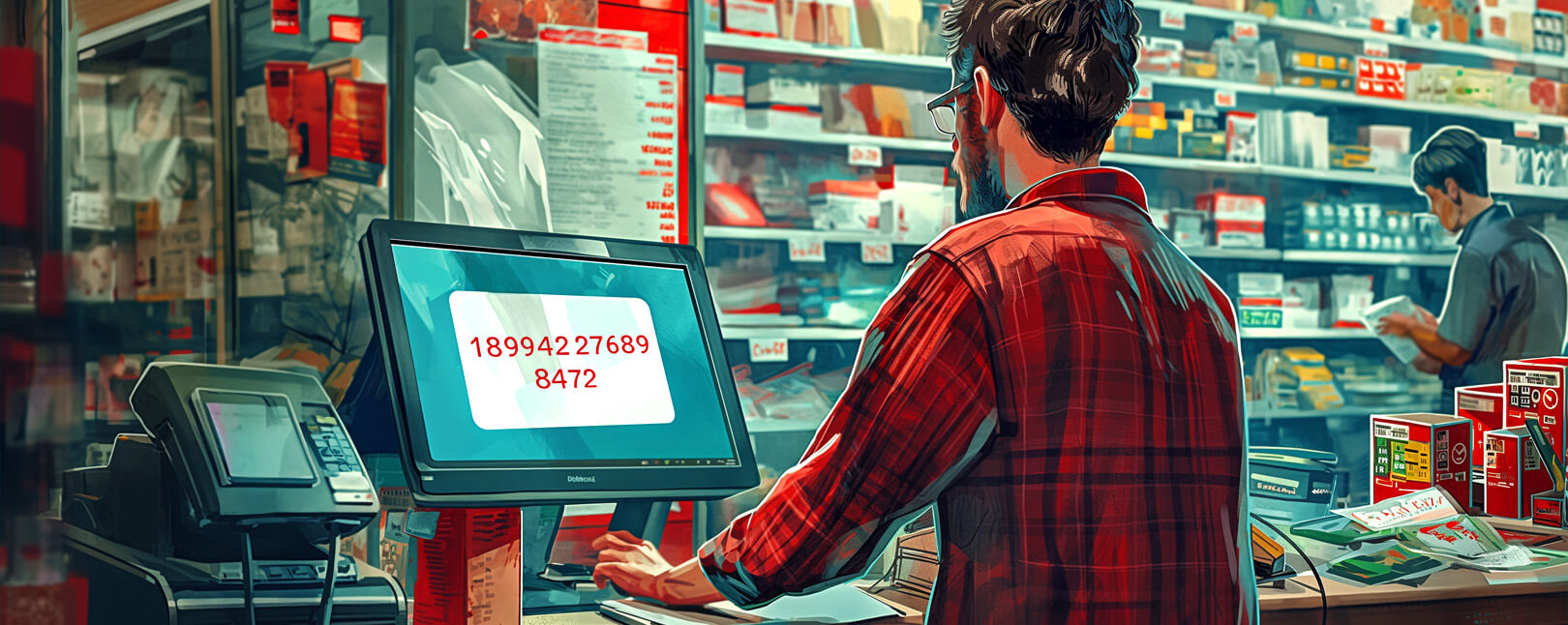What to Do If Your Bank Account is Under Investigation
It can be scary when your bank account is under investigation. You’re wondering if you could be out hundreds — or even thousands — of dollars. You’ve heard horror stories about cardholders who’ve literally seen their lives ruined by financial crime.
So… what’s going on?
If your bank account is under investigation, it’s likely because of one of a few possible scenarios. For instance, it could be that they believe someone charged an unauthorized transaction to your account. Or, the investigation might be tied to debts or suspected illicit activity. If you’re a merchant, it might even be because of excessive chargebacks.
But, before we get into the reasons why your account might be investigated, let’s go over the most basic question first.
Recommended reading
- Issuer vs Acquirer: What’s the Difference?
- 7 Common Reasons Why Issuer Declines Happen
- Merchant Identification Number: How to Find Your Merchant ID
- VAR Sheets: Get All Your Documents Ready in 4 Basic Steps
- Internet Processing: Understanding the eCommerce Process
- Is AI the Key to Improved Services for Younger Generations?
Do Banks Have the Right to Investigate My Account?
Yes, banks can investigate your account and examine your personal information. In fact, banks do what they do because of the law.
Banks are required to abide by a complex body of federal regulations. There are laws in place to try and prevent fraud whenever possible, and to ensure that consumers are protected and that both money and credit are able to circulate freely without issue.
Banks can face serious consequences for failing to abide by these rules. They can be fined, and bank officers can even face prosecution if they don’t conduct due diligence. At the end of the day, these banks need to protect themselves. That means placing your bank account under investigation if they have any reason to suspect fraud.
Banks have some leeway in choosing whether to freeze or close cardholders’ accounts. The reasons they might do this were outlined in your customer agreement. In the next section, we’ll touch on some of the most common reasons they might do this.
How Banks Conduct Investigations
What’s actually happening behind the scenes when your business account is under scrutiny?
Well, it's important to remember that you can't really steer the direction or speed of the investigation. Keep in mind that banks are in the business of making money, and they're not out to shut down accounts without good reason, though. They'll only take such a drastic step if they find solid proof of wrongdoing or if they see your account as too risky to handle.
The impact on your ability to use your account or access your money directly ties back to why your account caught the bank's eye in the first place. After you ask “why my bank account is under investigation?” here's a rundown of what you might experience:
Full Freeze
This happens when the issues are serious. Think involvement in scams, fraud, unauthorized transactions, fake documents, terrorism, or if the bank's been ordered by the courts to lock down your account. In such cases, expect to be completely cut off from your funds and any account features while the bank does its digging.
Partial Freeze
In this scenario, your transactions or activities have set off alarm bells for being potentially sketchy. This might be due to dealings in areas the bank considers risky, like gambling or undocumented crypto trades, moving to a place deemed high-risk, or any change that suddenly puts you in the high-risk category in the bank's eyes. With a partial freeze, your account is limited, but you're not entirely blocked from your money or some banking services.
During the investigation, the bank will likely be in touch, possibly asking for more documents or information to help clear things up faster. In any case, understanding these responses and staying proactive in communicating with your bank can help navigate through the investigation more smoothly.
Common Reasons for Bank Investigations
So, now we’re getting to the central question: “why is my bank account under investigation?”
You’re looking for a specific reason to explain this irritating (and potentially very dangerous) situation. So, let’s look at some of the most common reasons why your financial institution might put your bank account under investigation. These can apply to individual consumers, or to businesses. We’ll also give you some information about what steps to take next if your account is frozen or closed as a result of one of these issues:
#1 | For Your Safety
The Problem:
If your bank notices suspicious purchases, they may decide to take a closer look. This could be triggered by purchases that don’t fit your usual pattern, were initiated from a place in which you don’t live, or which were shipped to an address that’s not your home.
If this is the reason why they put your bank account under investigation, they likely froze your account. You definitely want that freeze to be in place, as it will prevent further criminal activity. If it was put in place by mistake, though, the misunderstanding can usually be resolved with a simple phone call.
What to do:
If fraud actually took place on your account, you want to let the bank proceed with their investigation. The good news is that, under the FDIC, your account will be insured for up to $100,000 in the US, less your share of liability. If you report debit card fraud within 60 days, you’ll be liable for no more than $500. In cases of credit card fraud, your liability is capped at just $50.
If, however, the freeze was placed in error, you want to reach out to the bank immediately. A phone call with a bank official should be sufficient to clear up any confusion, end the inquiry, and get your account back.
#2 | Debt
The Problem:
If you owe money to a creditor, they may have the right to freeze some — or all — of the money in your account. This can apply to mortgage debt, car loans, student loans, and other. It can also apply to debts stipulated by the courts, including legal judgements, child support, and back taxes.
You’re not safe, if you’re not personally the one who owes the debt. On a joint account, you might end up getting punished because of the debts owed by the person with whom you have the account.
What to do:
If you owe the debt in question, there isn’t much recourse available to you aside from either paying or renegotiating the debt. We suggest you try to start by finding out who the creditor is (your bank should be able to give you this information). We also recommend seeking legal advice, and possibly credit counseling if you can’t pay the debt right away.
#3 | You're Considered “Too Risky”
The Problem:
People or businesses who do business in so-called “high-risk” verticals may not be able to secure standard bank accounts. Obvious examples include industries that have only partial legal status depending on jurisdiction like gaming, guns and ammunition, adult entertainment, and cannabis. However, it can also apply to telemarketing, payday lending, and many online businesses.
This type of risk is assessed based on the susceptibility to chargebacks, based on the product or service you offer. Product categories that historically see higher chargeback rates can be considered risky.
What to do:
You can still do business, even if you operate in a high-risk vertical. However, you probably won’t be able to work with a standard bank.
You’ll need the services of an acquiring bank that specializes in providing accounts to high-risk merchants. The account will probably be more expensive, and come with more restrictions: after all, the bank needs to offset the cost of the increased chargeback risk. However, you can still do business just like before.
#4 | You Have Too Many Chargebacks
The Problem:
Going off that last point, a high chargeback rate can lead your bank to put your bank account under investigation. Remember: by offering to process transactions on your behalf, the bank is basically vouching for you to the card networks (Visa, Mastercard, etc.) and to other financial institutions. If you are unable to cover your liabilities because of chargebacks, the bank could be on the hook for them.
Your chargeback rate—the rate at which you receive chargebacks, as a portion of overall transactions you conduct—is an important indicator here. Each card network has their own predetermined chargeback threshold. If you breach this threshold, or even come close in some cases, the bank might freeze or close your account.
What to do:
Getting chargebacks under control is a challenge for a lot of merchants. Your first step should be identifying chargebacks by their source (merchant error, criminal fraud, or friendly fraud). You can then deploy the right strategy to address the issue and prevent disputes.
Seeking help from a qualified chargeback management specialist is a great option here. This will let you prevent chargebacks, thereby eliminating the reason why the bank account is under investigation. It will also allow you to spend your time and resources into growing your business.

#5 | The Bank Suspects Illicit Activity
The Problem:
Under the USA PATRIOT Act adopted in 2001, banks have to report suspicious activity that might suggest money laundering or the funding of terrorism. As with other points we mentioned before, the bank could be rendering themselves liable if they don’t conduct due diligence about these activities.
The bank may get suspicious if they see sudden large deposits and withdrawals or transfers, especially overseas or involving unknown parties. They might also view false information in your customer record or maintaining multiple different accounts as red flags, too.
This doesn’t have to extend to hardened crime, though. Piggybacking off our discussion about chargebacks, banks can actually investigate a cardholder, and even freeze or close their account, if the banks suspects that individual is engaged in a practice called “friendly fraud.”
What to do:
If you’re wrongly suspected of criminal activity, you want to clear this up with the bank—and with law enforcement—as quickly as possible.
We suggest reaching out to the bank immediately. They can give you some information about the investigation, and advise you whether it’s necessary at this point to contact the authorities. Contact a legal professional right away if you’re at all involved in a legal investigation. They can help you either resolve the situation, or give you counsel in case any charges are filed.
#6 | The Bank Received a Court Order
The Problem:
Sometimes, banks are told by the courts to check out an account. This could be because of legal issues, like a divorce, for instance. In these cases, the bank may be required to verify the amount of assets held in an account to ensure they’re divided properly.
It may also be due to a lawsuit, or investigation of a suspected crime like embezzlement or money laundering. In any of these cases, the bank is legally obligated to follow these orders.
What to do:
If this happens, getting a lawyer’s advice is very important. They can help you understand why your account is being checked and what you should do next. Following their advice and trying to work with the bank — within the law's boundaries, of course — is usually the best move.
#7 | Suspicious Keywords
The Problem:
Banks have systems in place that are designed to look for words or patterns in transactions that could suggest illegal activity, like money laundering. They also review transaction details, such as location, IP address, etc., for the same purposes.
There are plenty of legitimate reasons why you might do business in the Cayman Islands, for example. However, it is a location that is famously associated with financial crime. Therefore, if your transactions mention certain words, or contain certain elements that the bank finds suspicious, they might start asking questions just to verify that nothing torrid is going on.
What to do:
Keep your transaction descriptions clear and stick to the point. Also, make sure your transactions are well documented. If the bank gets worried about some words you've used or placed to which you’ve sent money, be ready to explain what those transactions were about, and to show proof that they were legit.
#8 | A High Volume of Transactions
The Problem:
Let’s say you have a fairly normal record account activity. Then, out of nowhere, your account suddenly has a lot of money moving in and out.
This could be because you’ve just turned a corner with your business, and you’re seeing exponential growth for the first time. Regardless, the bank might (reasonably) think something's off. They might be concerned this is a sign of something shady, like trying to hide money or dodge taxes. Or, they might worry that your account has been hijacked, and someone is using it for money muling or other fraudulent activity without your knowledge.
What to do:
If there's a good reason your account activity has changed (like your business is growing fast or you got a big payment), try to let your bank know ahead of time. If they still have questions, be ready to show them well-documented transaction records, proving the transactions in question happened.
#9 | Changes in Business Structure or Ownership
The Problem:
If there's a big change in how your account is set up or who has access to it, this could catch your bank's attention. This can apply to recent newlyweds, for example. It can also apply to businesses; if you suddenly bring in new partners, change from a sole proprietorship to a corporation, or there's a significant shift in who holds the majority of ownership, the bank might want to investigate.
These changes can affect the legal and financial responsibilities tied to the account. In turn, this raises questions about future transactions and the legitimacy of the account under its new structure.
What to do:
Before altering your account ownership, it's a good idea to talk to your bank. Letting them know about the changes in advance can help avoid any surprises. If your account does get investigated because of these changes, be ready to provide all the necessary documentation. This can be registration details, changes in any relevant business licenses, or any agreements that show the new ownership or structure.
#10 | Unusual Activity of Any Kind
The Problem:
Banks can have a fairly nebulous definition of what’s “unusual,” so think of this as more of a catch-all point.
Banks aren't just looking out for the things we've talked about. They also have to make sure no funny business is going on that could be breaking the rules in other ways. This includes dealing with countries or people that are considered risky, or who might even be subject to sanctions or other legal restrictions. It also means avoiding scams like ponzi schemes, or doing things that just don't make sense for a legitimate account holder.
What to do:
Being open and honest with your bank is the way to go. Check on your account now and then to make sure everything looks right. If the bank does start asking questions, help them out by giving them the information they need as soon as you can.
At the end of the day, banks have a lot of reasons to check on accounts, but it all comes down to keeping things safe and following the law. If your business account gets a closer look, being straightforward, helpful, and informed can make the process smoother and quicker.
How Should I Respond to an Investigation?
When you ask “why my bank account is under investigation?” finding the answer can be daunting. But, how you respond can significantly impact the process's outcome and duration. Here are steps you can take to navigate through an investigation of your account:
- 1. Initiate Contact: Don't wait for the bank to reach out to you. If you suspect that your bank account is under investigation, or you've noticed unusual account restrictions, get in touch with the bank to understand what's happening.
- 2. Stay in Touch: Make sure the bank has your current contact information and you respond promptly to any requests or inquiries. This shows that you're taking the matter seriously and are willing to cooperate.
- 3. Gather Your Records: Be prepared to provide any documents that can help clarify the situation. This might include invoices, receipts, contracts, or correspondence related to the transactions or activities in question.
- 4. Ask Questions: Find out what you can about the investigation process, including any specific concerns the bank has and how you can address them. This can help you provide targeted information that could expedite the resolution.
- 5. Seek Advice: Depending on the nature of the investigation, it might be wise to consult with a legal professional or a financial advisor. They can offer guidance on how to proceed and ensure that your rights are protected.
- 6. Record Any Conversations: Document all your communications with the bank, including dates, names of the officials you spoke with, and the essence of those conversations. This can be crucial if there are disputes about how the investigation was handled.
- 7. Monitor Account Activity: Keep an eye on your account statements and online banking portal to stay informed about any changes or updates to your account status.
- 8. Be Transparent: Provide all requested information honestly and completely. Attempts to withhold information can prolong the investigation and potentially lead to more severe consequences.
- 9. Understand Restrictions: If your account is partially or fully frozen, make sure you understand what you can and cannot do. Violating these restrictions could worsen the situation.
- 10. Plan for Contingencies: Depending on the nature of the freeze, you might need to make alternative arrangements to manage your financial obligations. Consider setting up a contingency plan if access to your funds is limited for an extended period.
Responding to a bank investigation with openness, preparedness, and cooperation can help smooth the process and lead to a quicker resolution. Remember, the bank's goal is to ensure compliance with regulations and protect against fraud. Demonstrating your willingness to work within these objectives is key.
Next Steps
So, now you're finally saying “I know my bank account is under investigation, and I know why.” The real question now: “What do I do about it?”
For cardholders these cases tend to be more isolated. If you're not implicated in any criminal activity, then simply addressing the problem in the manner outlined above should work. But, if you're a merchant facing the problem of having too many chargebacks, it could call for a longer-term, more protracted strategy.
At Chargebacks911, we offer a variety of expert-deployed tactics and machine learning-based technologies designed to identify—and eliminate—chargebacks at the source. Contact us today to see how much you stand to save.
FAQs
What happens when my bank account is under investigation?
When a bank account is under investigation, the bank examines the account's transactions and activities for signs of fraud, money laundering, or other regulatory breaches. Depending on their findings, this may lead to account restrictions, such as freezes on funds, until the investigation is concluded and concerns are resolved.
How long does a bank investigation take?
The duration of a bank investigation can vary widely, typically ranging from a few days to several weeks, depending on the complexity of the case and the nature of the suspected issues. The bank's efficiency and the account holder's responsiveness in providing necessary information can also influence the timeline.
How long can a bank freeze your account for an investigation?
A bank can freeze your account for the duration of the investigation, which can last from a few days to several months, depending on the case's complexity and the issues involved. Regulatory guidelines may set maximum durations for specific scenarios, but these can vary by jurisdiction and bank policy.
What happens when a bank closes your account for suspicious activity?
When a bank closes your account for suspicious activity, it discontinues your access to the account and its services, and will typically issue a check for the remaining balance. You may also receive a notification explaining the closure, although specifics about the suspicious activity may not be fully disclosed due to privacy and security concerns.
Should I be worried if the bank closed my account?
If the bank closes your account, it's important to understand the reasons behind the closure and address any underlying issues, as it can impact your financial reputation and ability to open accounts in the future. However, immediate concern is necessary only if it reflects unresolved financial issues or potential legal implications.
At what amount does your bank account get flagged?
Banks may flag your account for review if transactions exceed certain thresholds, typically involving deposits or withdrawals of $10,000 or more in the United States, due to regulations aimed at preventing money laundering and other illicit activities. The exact amount can vary depending on the country's laws and the bank's internal policies.













